6IB006 Debating Globalization: Neo-liberalism, US Hegemony, and China
VerifiedAdded on 2022/09/15
|13
|3676
|15
Essay
AI Summary
This essay delves into the intricate relationship between neo-liberalism and the development of US hegemony, analyzing how neo-liberal policies have shaped the US's global dominance. It explores the influence of neoliberalism on international financial institutions, particularly the IMF and World Bank, and the role the US plays in these institutions. Furthermore, the essay investigates the growing rivalry between the US and China for global hegemony, focusing on their competition in trade, including the use of tariffs and trade agreements, and other areas such as intellectual property rights. The analysis considers the extent to which China is challenging US hegemony and the factors driving this rivalry, providing a comprehensive overview of the evolving global power dynamics.
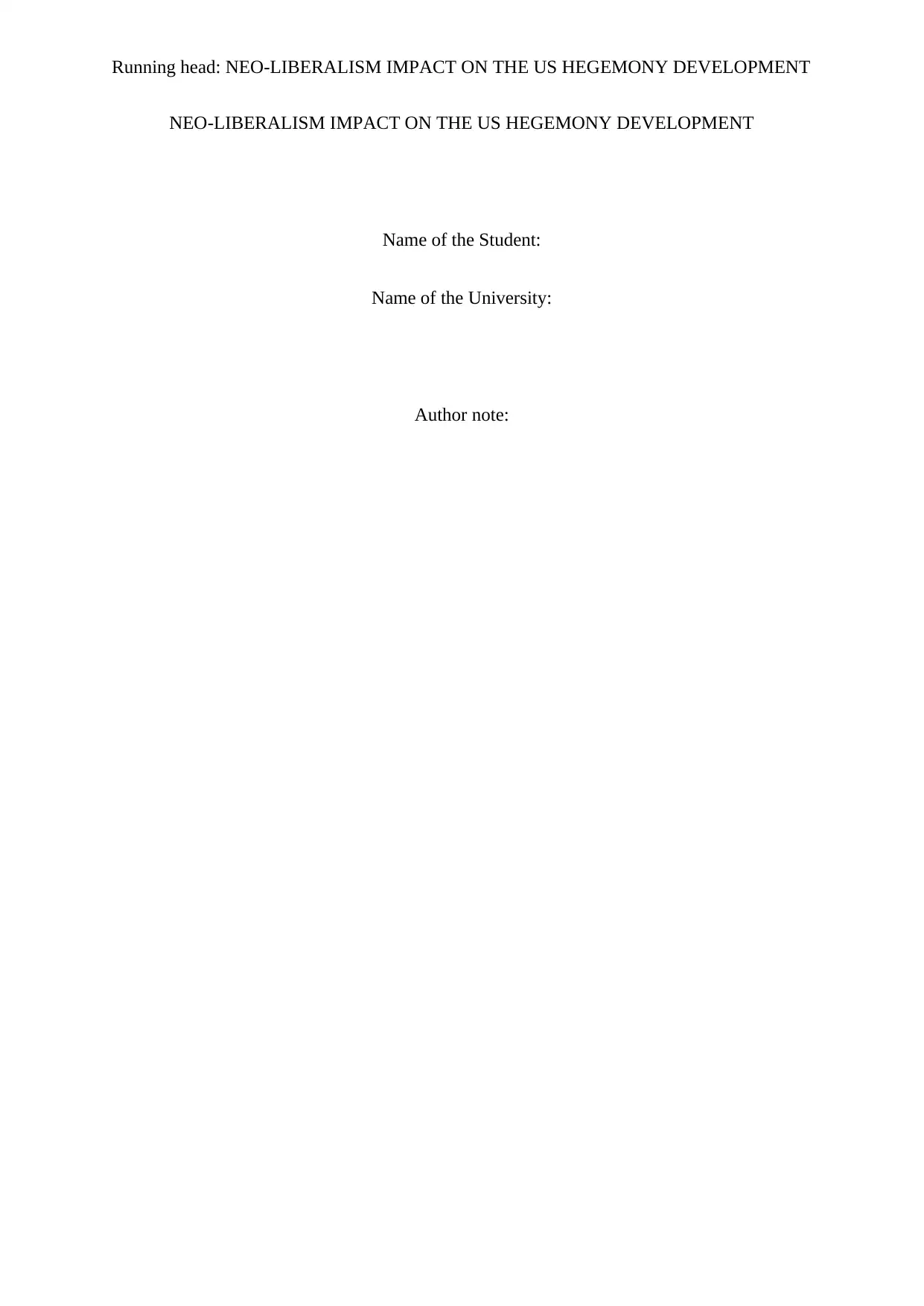
Running head: NEO-LIBERALISM IMPACT ON THE US HEGEMONY DEVELOPMENT
NEO-LIBERALISM IMPACT ON THE US HEGEMONY DEVELOPMENT
Name of the Student:
Name of the University:
Author note:
NEO-LIBERALISM IMPACT ON THE US HEGEMONY DEVELOPMENT
Name of the Student:
Name of the University:
Author note:
Paraphrase This Document
Need a fresh take? Get an instant paraphrase of this document with our AI Paraphraser
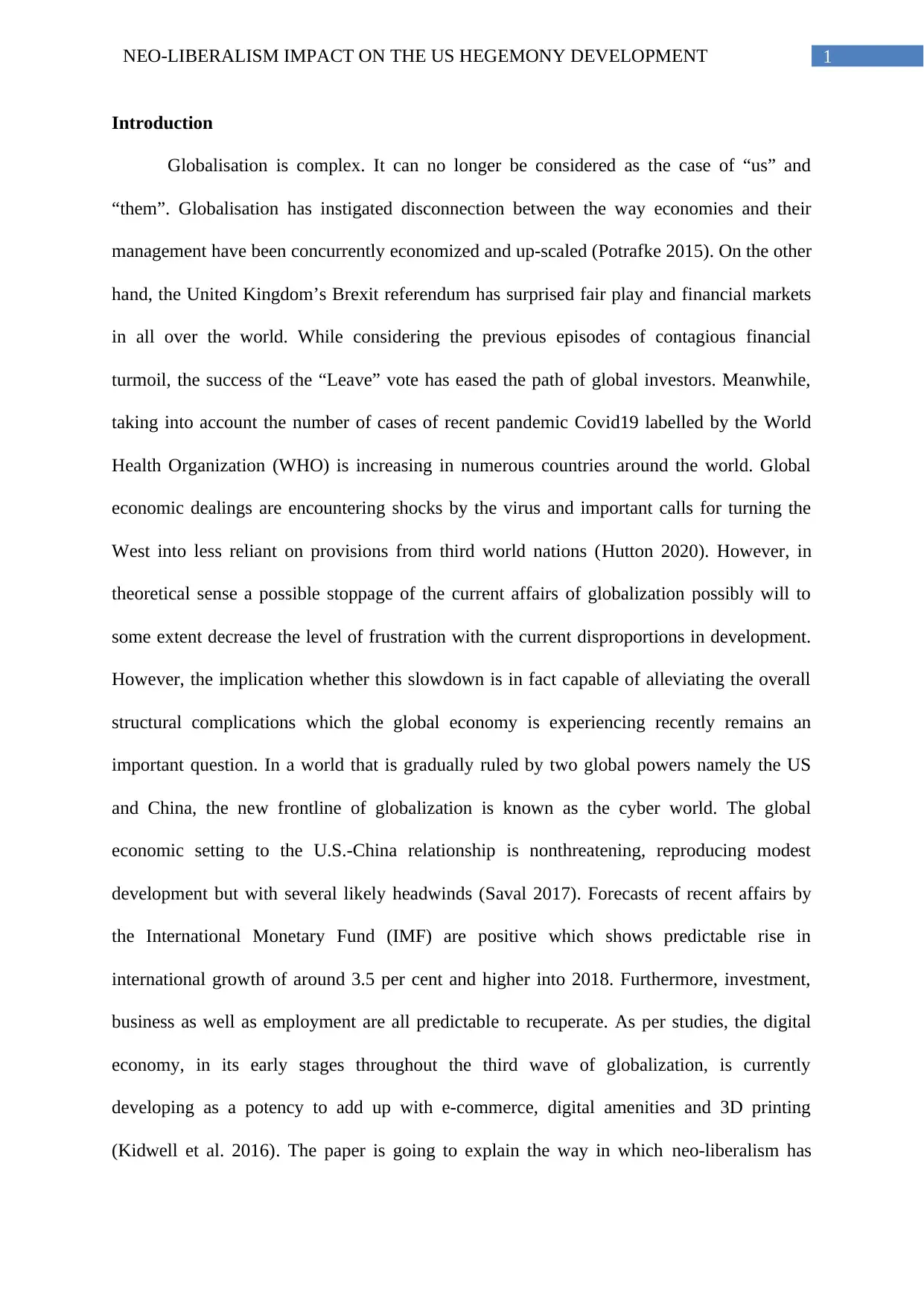
1NEO-LIBERALISM IMPACT ON THE US HEGEMONY DEVELOPMENT
Introduction
Globalisation is complex. It can no longer be considered as the case of “us” and
“them”. Globalisation has instigated disconnection between the way economies and their
management have been concurrently economized and up-scaled (Potrafke 2015). On the other
hand, the United Kingdom’s Brexit referendum has surprised fair play and financial markets
in all over the world. While considering the previous episodes of contagious financial
turmoil, the success of the “Leave” vote has eased the path of global investors. Meanwhile,
taking into account the number of cases of recent pandemic Covid19 labelled by the World
Health Organization (WHO) is increasing in numerous countries around the world. Global
economic dealings are encountering shocks by the virus and important calls for turning the
West into less reliant on provisions from third world nations (Hutton 2020). However, in
theoretical sense a possible stoppage of the current affairs of globalization possibly will to
some extent decrease the level of frustration with the current disproportions in development.
However, the implication whether this slowdown is in fact capable of alleviating the overall
structural complications which the global economy is experiencing recently remains an
important question. In a world that is gradually ruled by two global powers namely the US
and China, the new frontline of globalization is known as the cyber world. The global
economic setting to the U.S.-China relationship is nonthreatening, reproducing modest
development but with several likely headwinds (Saval 2017). Forecasts of recent affairs by
the International Monetary Fund (IMF) are positive which shows predictable rise in
international growth of around 3.5 per cent and higher into 2018. Furthermore, investment,
business as well as employment are all predictable to recuperate. As per studies, the digital
economy, in its early stages throughout the third wave of globalization, is currently
developing as a potency to add up with e-commerce, digital amenities and 3D printing
(Kidwell et al. 2016). The paper is going to explain the way in which neo-liberalism has
Introduction
Globalisation is complex. It can no longer be considered as the case of “us” and
“them”. Globalisation has instigated disconnection between the way economies and their
management have been concurrently economized and up-scaled (Potrafke 2015). On the other
hand, the United Kingdom’s Brexit referendum has surprised fair play and financial markets
in all over the world. While considering the previous episodes of contagious financial
turmoil, the success of the “Leave” vote has eased the path of global investors. Meanwhile,
taking into account the number of cases of recent pandemic Covid19 labelled by the World
Health Organization (WHO) is increasing in numerous countries around the world. Global
economic dealings are encountering shocks by the virus and important calls for turning the
West into less reliant on provisions from third world nations (Hutton 2020). However, in
theoretical sense a possible stoppage of the current affairs of globalization possibly will to
some extent decrease the level of frustration with the current disproportions in development.
However, the implication whether this slowdown is in fact capable of alleviating the overall
structural complications which the global economy is experiencing recently remains an
important question. In a world that is gradually ruled by two global powers namely the US
and China, the new frontline of globalization is known as the cyber world. The global
economic setting to the U.S.-China relationship is nonthreatening, reproducing modest
development but with several likely headwinds (Saval 2017). Forecasts of recent affairs by
the International Monetary Fund (IMF) are positive which shows predictable rise in
international growth of around 3.5 per cent and higher into 2018. Furthermore, investment,
business as well as employment are all predictable to recuperate. As per studies, the digital
economy, in its early stages throughout the third wave of globalization, is currently
developing as a potency to add up with e-commerce, digital amenities and 3D printing
(Kidwell et al. 2016). The paper is going to explain the way in which neo-liberalism has
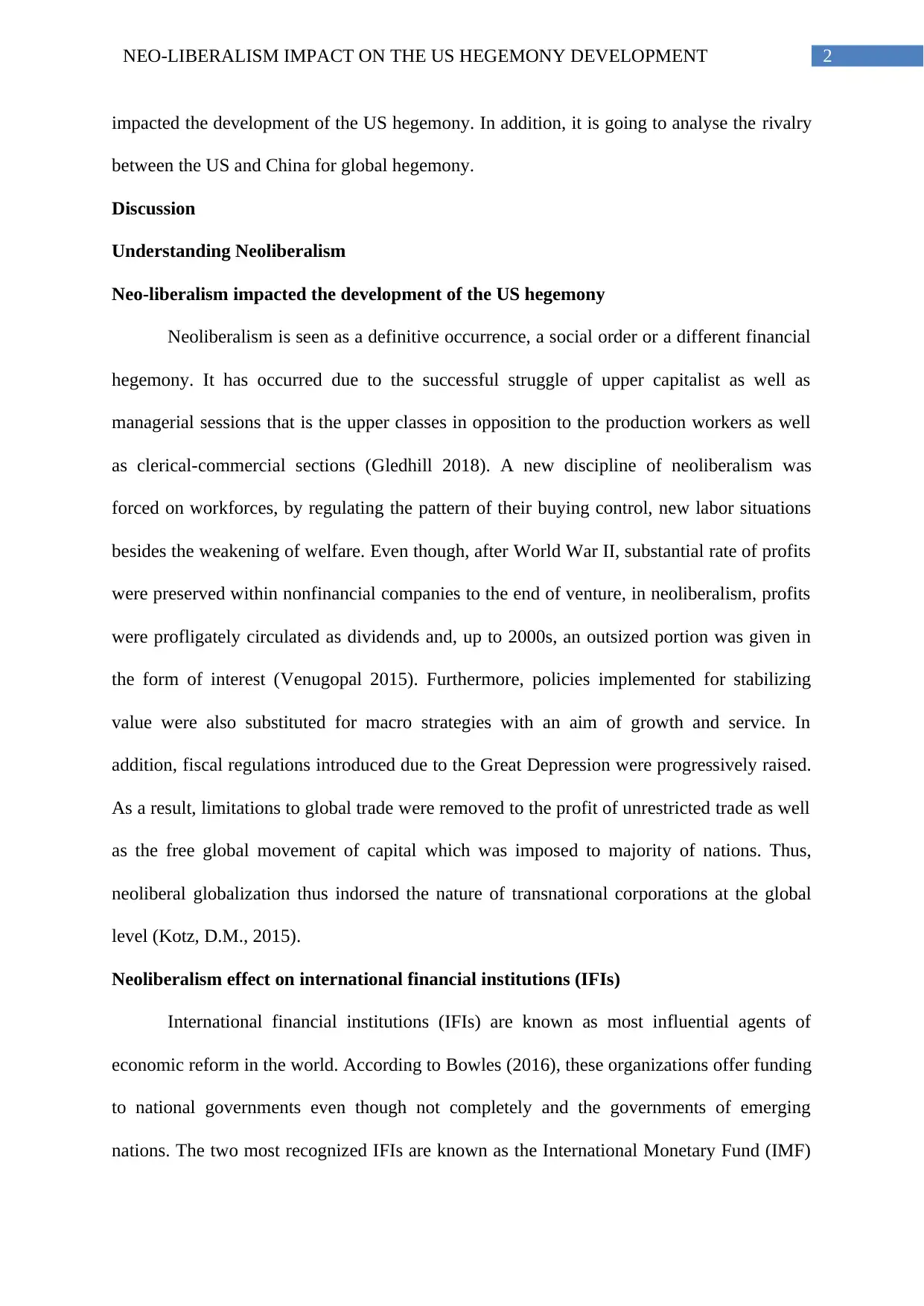
2NEO-LIBERALISM IMPACT ON THE US HEGEMONY DEVELOPMENT
impacted the development of the US hegemony. In addition, it is going to analyse the rivalry
between the US and China for global hegemony.
Discussion
Understanding Neoliberalism
Neo-liberalism impacted the development of the US hegemony
Neoliberalism is seen as a definitive occurrence, a social order or a different financial
hegemony. It has occurred due to the successful struggle of upper capitalist as well as
managerial sessions that is the upper classes in opposition to the production workers as well
as clerical-commercial sections (Gledhill 2018). A new discipline of neoliberalism was
forced on workforces, by regulating the pattern of their buying control, new labor situations
besides the weakening of welfare. Even though, after World War II, substantial rate of profits
were preserved within nonfinancial companies to the end of venture, in neoliberalism, profits
were profligately circulated as dividends and, up to 2000s, an outsized portion was given in
the form of interest (Venugopal 2015). Furthermore, policies implemented for stabilizing
value were also substituted for macro strategies with an aim of growth and service. In
addition, fiscal regulations introduced due to the Great Depression were progressively raised.
As a result, limitations to global trade were removed to the profit of unrestricted trade as well
as the free global movement of capital which was imposed to majority of nations. Thus,
neoliberal globalization thus indorsed the nature of transnational corporations at the global
level (Kotz, D.M., 2015).
Neoliberalism effect on international financial institutions (IFIs)
International financial institutions (IFIs) are known as most influential agents of
economic reform in the world. According to Bowles (2016), these organizations offer funding
to national governments even though not completely and the governments of emerging
nations. The two most recognized IFIs are known as the International Monetary Fund (IMF)
impacted the development of the US hegemony. In addition, it is going to analyse the rivalry
between the US and China for global hegemony.
Discussion
Understanding Neoliberalism
Neo-liberalism impacted the development of the US hegemony
Neoliberalism is seen as a definitive occurrence, a social order or a different financial
hegemony. It has occurred due to the successful struggle of upper capitalist as well as
managerial sessions that is the upper classes in opposition to the production workers as well
as clerical-commercial sections (Gledhill 2018). A new discipline of neoliberalism was
forced on workforces, by regulating the pattern of their buying control, new labor situations
besides the weakening of welfare. Even though, after World War II, substantial rate of profits
were preserved within nonfinancial companies to the end of venture, in neoliberalism, profits
were profligately circulated as dividends and, up to 2000s, an outsized portion was given in
the form of interest (Venugopal 2015). Furthermore, policies implemented for stabilizing
value were also substituted for macro strategies with an aim of growth and service. In
addition, fiscal regulations introduced due to the Great Depression were progressively raised.
As a result, limitations to global trade were removed to the profit of unrestricted trade as well
as the free global movement of capital which was imposed to majority of nations. Thus,
neoliberal globalization thus indorsed the nature of transnational corporations at the global
level (Kotz, D.M., 2015).
Neoliberalism effect on international financial institutions (IFIs)
International financial institutions (IFIs) are known as most influential agents of
economic reform in the world. According to Bowles (2016), these organizations offer funding
to national governments even though not completely and the governments of emerging
nations. The two most recognized IFIs are known as the International Monetary Fund (IMF)
⊘ This is a preview!⊘
Do you want full access?
Subscribe today to unlock all pages.

Trusted by 1+ million students worldwide
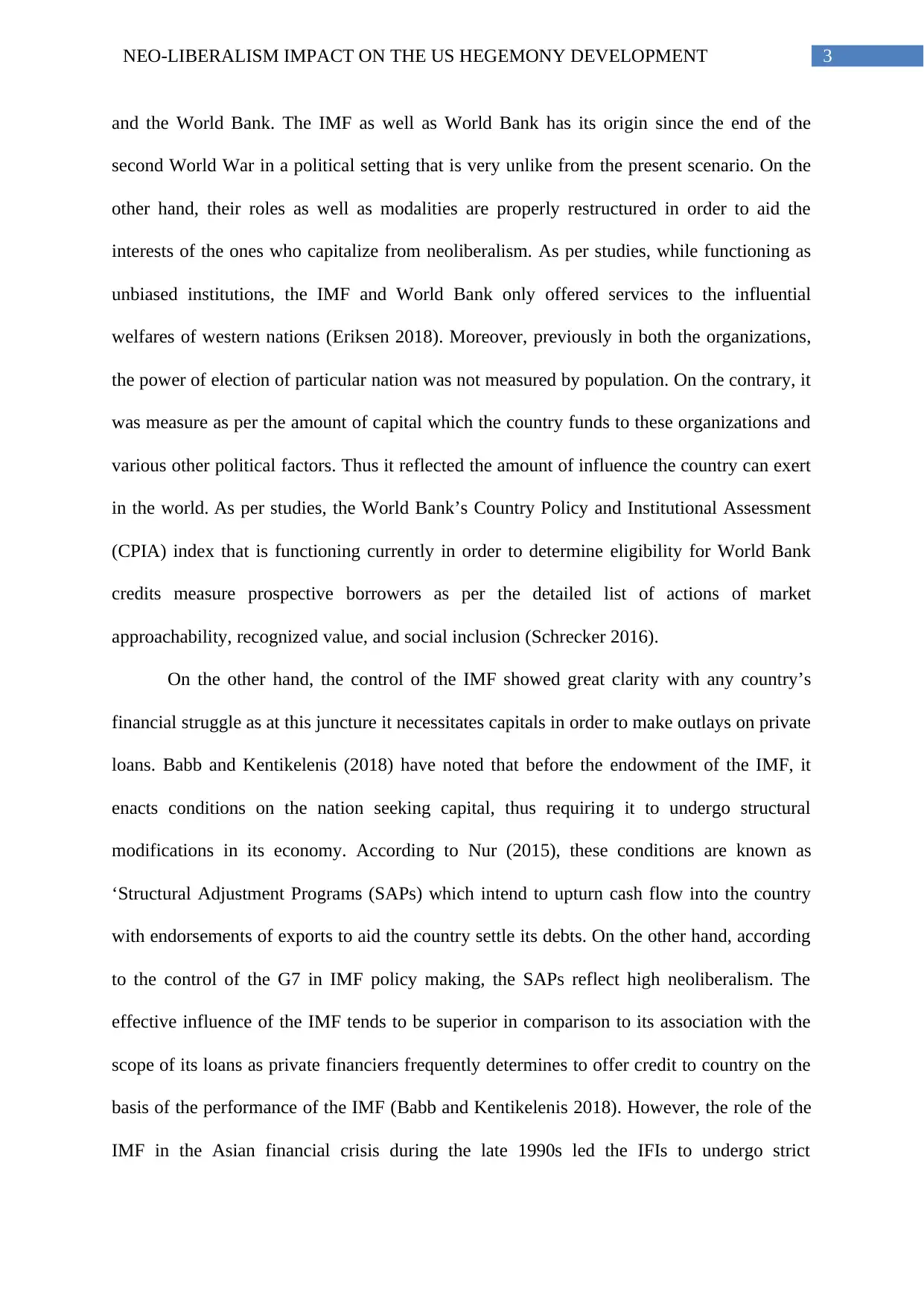
3NEO-LIBERALISM IMPACT ON THE US HEGEMONY DEVELOPMENT
and the World Bank. The IMF as well as World Bank has its origin since the end of the
second World War in a political setting that is very unlike from the present scenario. On the
other hand, their roles as well as modalities are properly restructured in order to aid the
interests of the ones who capitalize from neoliberalism. As per studies, while functioning as
unbiased institutions, the IMF and World Bank only offered services to the influential
welfares of western nations (Eriksen 2018). Moreover, previously in both the organizations,
the power of election of particular nation was not measured by population. On the contrary, it
was measure as per the amount of capital which the country funds to these organizations and
various other political factors. Thus it reflected the amount of influence the country can exert
in the world. As per studies, the World Bank’s Country Policy and Institutional Assessment
(CPIA) index that is functioning currently in order to determine eligibility for World Bank
credits measure prospective borrowers as per the detailed list of actions of market
approachability, recognized value, and social inclusion (Schrecker 2016).
On the other hand, the control of the IMF showed great clarity with any country’s
financial struggle as at this juncture it necessitates capitals in order to make outlays on private
loans. Babb and Kentikelenis (2018) have noted that before the endowment of the IMF, it
enacts conditions on the nation seeking capital, thus requiring it to undergo structural
modifications in its economy. According to Nur (2015), these conditions are known as
‘Structural Adjustment Programs (SAPs) which intend to upturn cash flow into the country
with endorsements of exports to aid the country settle its debts. On the other hand, according
to the control of the G7 in IMF policy making, the SAPs reflect high neoliberalism. The
effective influence of the IMF tends to be superior in comparison to its association with the
scope of its loans as private financiers frequently determines to offer credit to country on the
basis of the performance of the IMF (Babb and Kentikelenis 2018). However, the role of the
IMF in the Asian financial crisis during the late 1990s led the IFIs to undergo strict
and the World Bank. The IMF as well as World Bank has its origin since the end of the
second World War in a political setting that is very unlike from the present scenario. On the
other hand, their roles as well as modalities are properly restructured in order to aid the
interests of the ones who capitalize from neoliberalism. As per studies, while functioning as
unbiased institutions, the IMF and World Bank only offered services to the influential
welfares of western nations (Eriksen 2018). Moreover, previously in both the organizations,
the power of election of particular nation was not measured by population. On the contrary, it
was measure as per the amount of capital which the country funds to these organizations and
various other political factors. Thus it reflected the amount of influence the country can exert
in the world. As per studies, the World Bank’s Country Policy and Institutional Assessment
(CPIA) index that is functioning currently in order to determine eligibility for World Bank
credits measure prospective borrowers as per the detailed list of actions of market
approachability, recognized value, and social inclusion (Schrecker 2016).
On the other hand, the control of the IMF showed great clarity with any country’s
financial struggle as at this juncture it necessitates capitals in order to make outlays on private
loans. Babb and Kentikelenis (2018) have noted that before the endowment of the IMF, it
enacts conditions on the nation seeking capital, thus requiring it to undergo structural
modifications in its economy. According to Nur (2015), these conditions are known as
‘Structural Adjustment Programs (SAPs) which intend to upturn cash flow into the country
with endorsements of exports to aid the country settle its debts. On the other hand, according
to the control of the G7 in IMF policy making, the SAPs reflect high neoliberalism. The
effective influence of the IMF tends to be superior in comparison to its association with the
scope of its loans as private financiers frequently determines to offer credit to country on the
basis of the performance of the IMF (Babb and Kentikelenis 2018). However, the role of the
IMF in the Asian financial crisis during the late 1990s led the IFIs to undergo strict
Paraphrase This Document
Need a fresh take? Get an instant paraphrase of this document with our AI Paraphraser
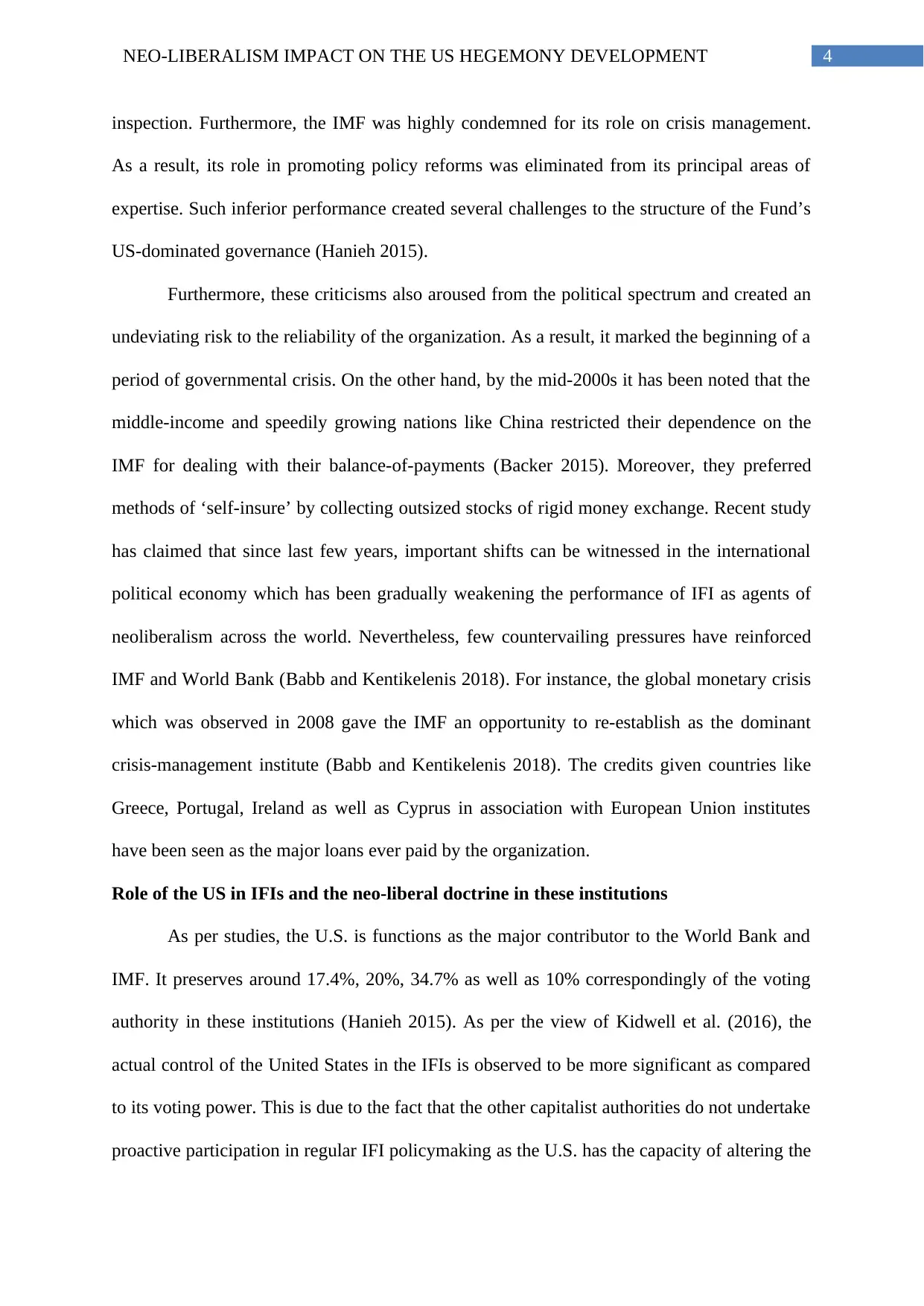
4NEO-LIBERALISM IMPACT ON THE US HEGEMONY DEVELOPMENT
inspection. Furthermore, the IMF was highly condemned for its role on crisis management.
As a result, its role in promoting policy reforms was eliminated from its principal areas of
expertise. Such inferior performance created several challenges to the structure of the Fund’s
US-dominated governance (Hanieh 2015).
Furthermore, these criticisms also aroused from the political spectrum and created an
undeviating risk to the reliability of the organization. As a result, it marked the beginning of a
period of governmental crisis. On the other hand, by the mid-2000s it has been noted that the
middle-income and speedily growing nations like China restricted their dependence on the
IMF for dealing with their balance-of-payments (Backer 2015). Moreover, they preferred
methods of ‘self-insure’ by collecting outsized stocks of rigid money exchange. Recent study
has claimed that since last few years, important shifts can be witnessed in the international
political economy which has been gradually weakening the performance of IFI as agents of
neoliberalism across the world. Nevertheless, few countervailing pressures have reinforced
IMF and World Bank (Babb and Kentikelenis 2018). For instance, the global monetary crisis
which was observed in 2008 gave the IMF an opportunity to re-establish as the dominant
crisis-management institute (Babb and Kentikelenis 2018). The credits given countries like
Greece, Portugal, Ireland as well as Cyprus in association with European Union institutes
have been seen as the major loans ever paid by the organization.
Role of the US in IFIs and the neo-liberal doctrine in these institutions
As per studies, the U.S. is functions as the major contributor to the World Bank and
IMF. It preserves around 17.4%, 20%, 34.7% as well as 10% correspondingly of the voting
authority in these institutions (Hanieh 2015). As per the view of Kidwell et al. (2016), the
actual control of the United States in the IFIs is observed to be more significant as compared
to its voting power. This is due to the fact that the other capitalist authorities do not undertake
proactive participation in regular IFI policymaking as the U.S. has the capacity of altering the
inspection. Furthermore, the IMF was highly condemned for its role on crisis management.
As a result, its role in promoting policy reforms was eliminated from its principal areas of
expertise. Such inferior performance created several challenges to the structure of the Fund’s
US-dominated governance (Hanieh 2015).
Furthermore, these criticisms also aroused from the political spectrum and created an
undeviating risk to the reliability of the organization. As a result, it marked the beginning of a
period of governmental crisis. On the other hand, by the mid-2000s it has been noted that the
middle-income and speedily growing nations like China restricted their dependence on the
IMF for dealing with their balance-of-payments (Backer 2015). Moreover, they preferred
methods of ‘self-insure’ by collecting outsized stocks of rigid money exchange. Recent study
has claimed that since last few years, important shifts can be witnessed in the international
political economy which has been gradually weakening the performance of IFI as agents of
neoliberalism across the world. Nevertheless, few countervailing pressures have reinforced
IMF and World Bank (Babb and Kentikelenis 2018). For instance, the global monetary crisis
which was observed in 2008 gave the IMF an opportunity to re-establish as the dominant
crisis-management institute (Babb and Kentikelenis 2018). The credits given countries like
Greece, Portugal, Ireland as well as Cyprus in association with European Union institutes
have been seen as the major loans ever paid by the organization.
Role of the US in IFIs and the neo-liberal doctrine in these institutions
As per studies, the U.S. is functions as the major contributor to the World Bank and
IMF. It preserves around 17.4%, 20%, 34.7% as well as 10% correspondingly of the voting
authority in these institutions (Hanieh 2015). As per the view of Kidwell et al. (2016), the
actual control of the United States in the IFIs is observed to be more significant as compared
to its voting power. This is due to the fact that the other capitalist authorities do not undertake
proactive participation in regular IFI policymaking as the U.S. has the capacity of altering the
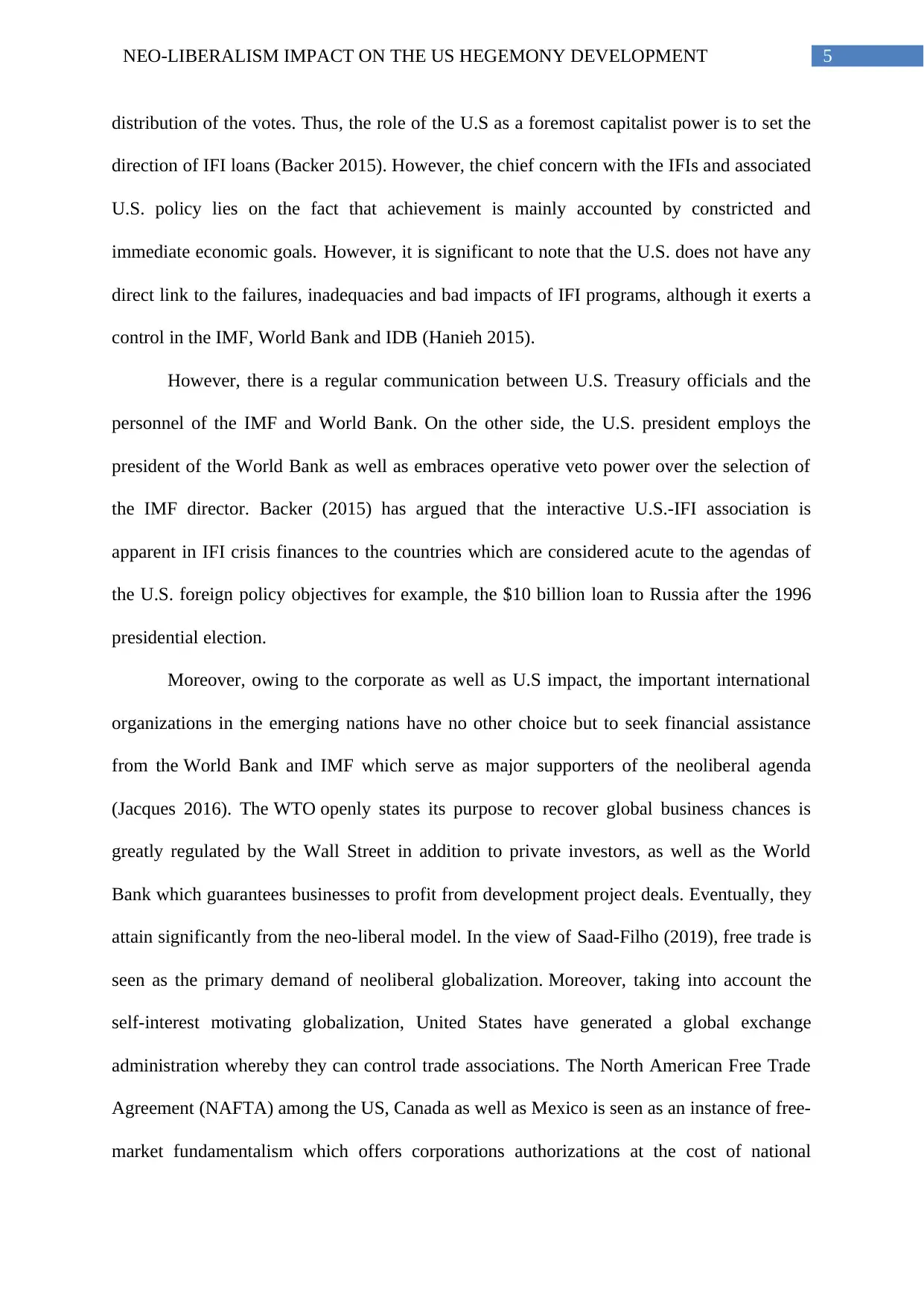
5NEO-LIBERALISM IMPACT ON THE US HEGEMONY DEVELOPMENT
distribution of the votes. Thus, the role of the U.S as a foremost capitalist power is to set the
direction of IFI loans (Backer 2015). However, the chief concern with the IFIs and associated
U.S. policy lies on the fact that achievement is mainly accounted by constricted and
immediate economic goals. However, it is significant to note that the U.S. does not have any
direct link to the failures, inadequacies and bad impacts of IFI programs, although it exerts a
control in the IMF, World Bank and IDB (Hanieh 2015).
However, there is a regular communication between U.S. Treasury officials and the
personnel of the IMF and World Bank. On the other side, the U.S. president employs the
president of the World Bank as well as embraces operative veto power over the selection of
the IMF director. Backer (2015) has argued that the interactive U.S.-IFI association is
apparent in IFI crisis finances to the countries which are considered acute to the agendas of
the U.S. foreign policy objectives for example, the $10 billion loan to Russia after the 1996
presidential election.
Moreover, owing to the corporate as well as U.S impact, the important international
organizations in the emerging nations have no other choice but to seek financial assistance
from the World Bank and IMF which serve as major supporters of the neoliberal agenda
(Jacques 2016). The WTO openly states its purpose to recover global business chances is
greatly regulated by the Wall Street in addition to private investors, as well as the World
Bank which guarantees businesses to profit from development project deals. Eventually, they
attain significantly from the neo-liberal model. In the view of Saad-Filho (2019), free trade is
seen as the primary demand of neoliberal globalization. Moreover, taking into account the
self-interest motivating globalization, United States have generated a global exchange
administration whereby they can control trade associations. The North American Free Trade
Agreement (NAFTA) among the US, Canada as well as Mexico is seen as an instance of free-
market fundamentalism which offers corporations authorizations at the cost of national
distribution of the votes. Thus, the role of the U.S as a foremost capitalist power is to set the
direction of IFI loans (Backer 2015). However, the chief concern with the IFIs and associated
U.S. policy lies on the fact that achievement is mainly accounted by constricted and
immediate economic goals. However, it is significant to note that the U.S. does not have any
direct link to the failures, inadequacies and bad impacts of IFI programs, although it exerts a
control in the IMF, World Bank and IDB (Hanieh 2015).
However, there is a regular communication between U.S. Treasury officials and the
personnel of the IMF and World Bank. On the other side, the U.S. president employs the
president of the World Bank as well as embraces operative veto power over the selection of
the IMF director. Backer (2015) has argued that the interactive U.S.-IFI association is
apparent in IFI crisis finances to the countries which are considered acute to the agendas of
the U.S. foreign policy objectives for example, the $10 billion loan to Russia after the 1996
presidential election.
Moreover, owing to the corporate as well as U.S impact, the important international
organizations in the emerging nations have no other choice but to seek financial assistance
from the World Bank and IMF which serve as major supporters of the neoliberal agenda
(Jacques 2016). The WTO openly states its purpose to recover global business chances is
greatly regulated by the Wall Street in addition to private investors, as well as the World
Bank which guarantees businesses to profit from development project deals. Eventually, they
attain significantly from the neo-liberal model. In the view of Saad-Filho (2019), free trade is
seen as the primary demand of neoliberal globalization. Moreover, taking into account the
self-interest motivating globalization, United States have generated a global exchange
administration whereby they can control trade associations. The North American Free Trade
Agreement (NAFTA) among the US, Canada as well as Mexico is seen as an instance of free-
market fundamentalism which offers corporations authorizations at the cost of national
⊘ This is a preview!⊘
Do you want full access?
Subscribe today to unlock all pages.

Trusted by 1+ million students worldwide
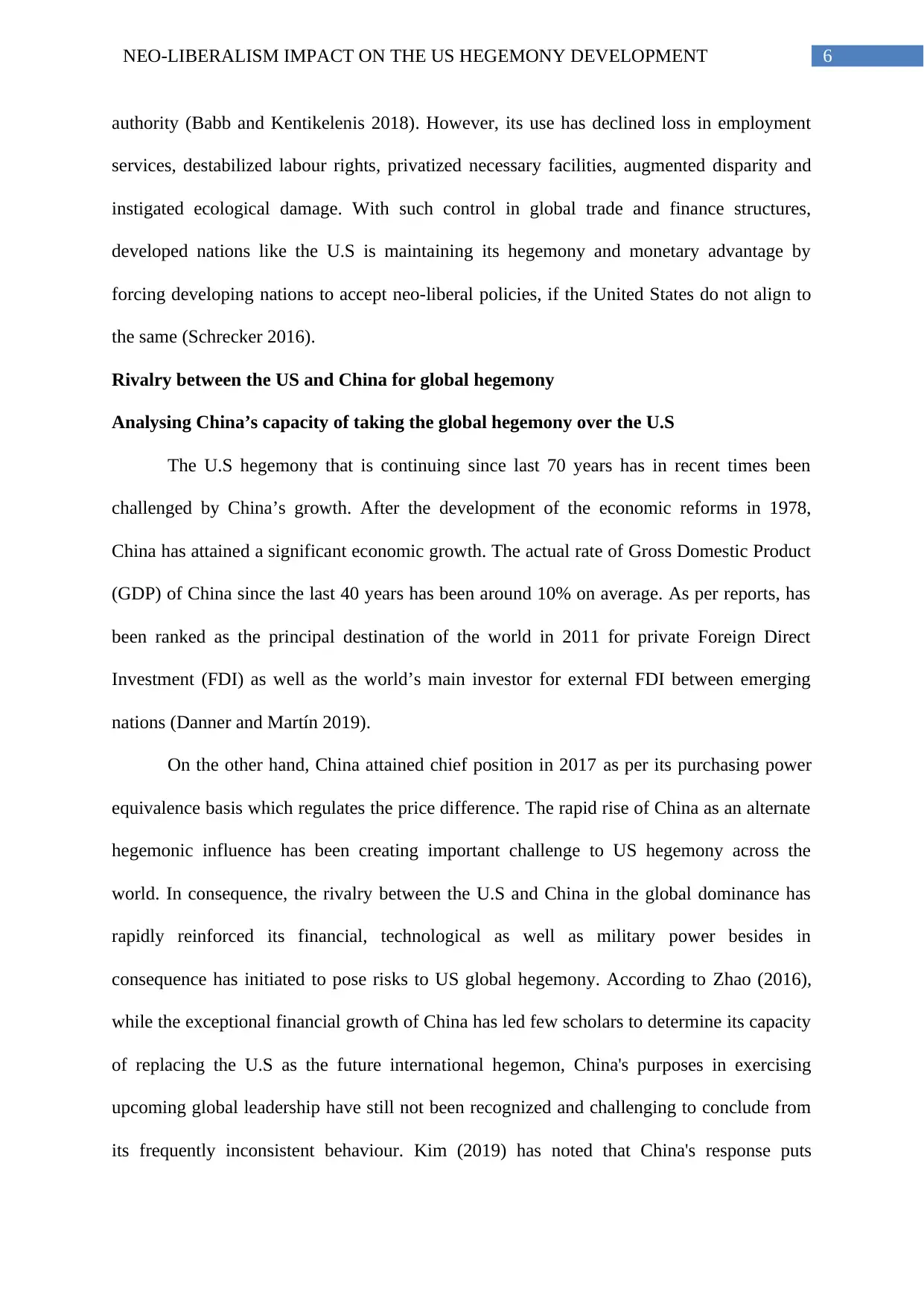
6NEO-LIBERALISM IMPACT ON THE US HEGEMONY DEVELOPMENT
authority (Babb and Kentikelenis 2018). However, its use has declined loss in employment
services, destabilized labour rights, privatized necessary facilities, augmented disparity and
instigated ecological damage. With such control in global trade and finance structures,
developed nations like the U.S is maintaining its hegemony and monetary advantage by
forcing developing nations to accept neo-liberal policies, if the United States do not align to
the same (Schrecker 2016).
Rivalry between the US and China for global hegemony
Analysing China’s capacity of taking the global hegemony over the U.S
The U.S hegemony that is continuing since last 70 years has in recent times been
challenged by China’s growth. After the development of the economic reforms in 1978,
China has attained a significant economic growth. The actual rate of Gross Domestic Product
(GDP) of China since the last 40 years has been around 10% on average. As per reports, has
been ranked as the principal destination of the world in 2011 for private Foreign Direct
Investment (FDI) as well as the world’s main investor for external FDI between emerging
nations (Danner and Martín 2019).
On the other hand, China attained chief position in 2017 as per its purchasing power
equivalence basis which regulates the price difference. The rapid rise of China as an alternate
hegemonic influence has been creating important challenge to US hegemony across the
world. In consequence, the rivalry between the U.S and China in the global dominance has
rapidly reinforced its financial, technological as well as military power besides in
consequence has initiated to pose risks to US global hegemony. According to Zhao (2016),
while the exceptional financial growth of China has led few scholars to determine its capacity
of replacing the U.S as the future international hegemon, China's purposes in exercising
upcoming global leadership have still not been recognized and challenging to conclude from
its frequently inconsistent behaviour. Kim (2019) has noted that China's response puts
authority (Babb and Kentikelenis 2018). However, its use has declined loss in employment
services, destabilized labour rights, privatized necessary facilities, augmented disparity and
instigated ecological damage. With such control in global trade and finance structures,
developed nations like the U.S is maintaining its hegemony and monetary advantage by
forcing developing nations to accept neo-liberal policies, if the United States do not align to
the same (Schrecker 2016).
Rivalry between the US and China for global hegemony
Analysing China’s capacity of taking the global hegemony over the U.S
The U.S hegemony that is continuing since last 70 years has in recent times been
challenged by China’s growth. After the development of the economic reforms in 1978,
China has attained a significant economic growth. The actual rate of Gross Domestic Product
(GDP) of China since the last 40 years has been around 10% on average. As per reports, has
been ranked as the principal destination of the world in 2011 for private Foreign Direct
Investment (FDI) as well as the world’s main investor for external FDI between emerging
nations (Danner and Martín 2019).
On the other hand, China attained chief position in 2017 as per its purchasing power
equivalence basis which regulates the price difference. The rapid rise of China as an alternate
hegemonic influence has been creating important challenge to US hegemony across the
world. In consequence, the rivalry between the U.S and China in the global dominance has
rapidly reinforced its financial, technological as well as military power besides in
consequence has initiated to pose risks to US global hegemony. According to Zhao (2016),
while the exceptional financial growth of China has led few scholars to determine its capacity
of replacing the U.S as the future international hegemon, China's purposes in exercising
upcoming global leadership have still not been recognized and challenging to conclude from
its frequently inconsistent behaviour. Kim (2019) has noted that China's response puts
Paraphrase This Document
Need a fresh take? Get an instant paraphrase of this document with our AI Paraphraser
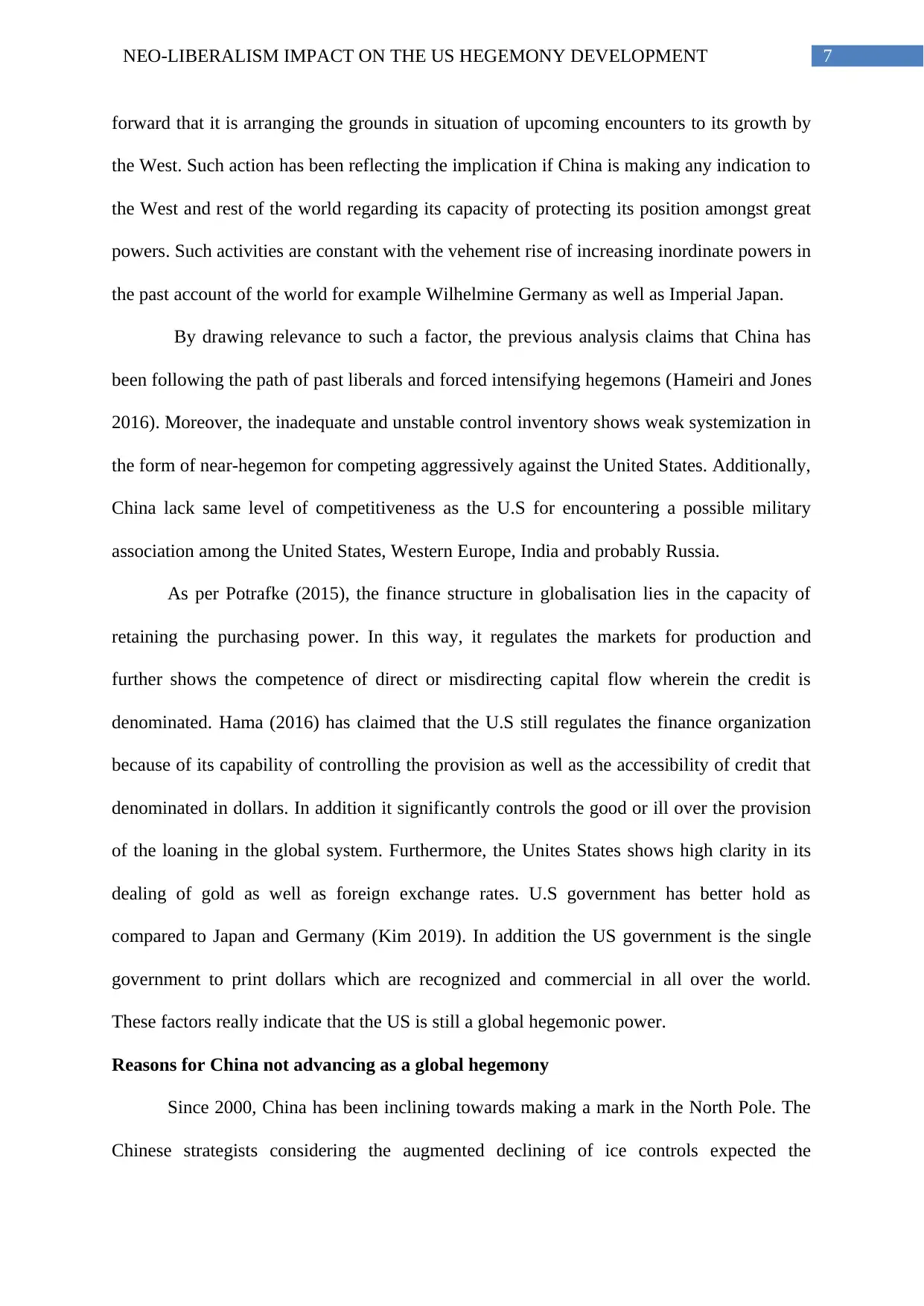
7NEO-LIBERALISM IMPACT ON THE US HEGEMONY DEVELOPMENT
forward that it is arranging the grounds in situation of upcoming encounters to its growth by
the West. Such action has been reflecting the implication if China is making any indication to
the West and rest of the world regarding its capacity of protecting its position amongst great
powers. Such activities are constant with the vehement rise of increasing inordinate powers in
the past account of the world for example Wilhelmine Germany as well as Imperial Japan.
By drawing relevance to such a factor, the previous analysis claims that China has
been following the path of past liberals and forced intensifying hegemons (Hameiri and Jones
2016). Moreover, the inadequate and unstable control inventory shows weak systemization in
the form of near‐hegemon for competing aggressively against the United States. Additionally,
China lack same level of competitiveness as the U.S for encountering a possible military
association among the United States, Western Europe, India and probably Russia.
As per Potrafke (2015), the finance structure in globalisation lies in the capacity of
retaining the purchasing power. In this way, it regulates the markets for production and
further shows the competence of direct or misdirecting capital flow wherein the credit is
denominated. Hama (2016) has claimed that the U.S still regulates the finance organization
because of its capability of controlling the provision as well as the accessibility of credit that
denominated in dollars. In addition it significantly controls the good or ill over the provision
of the loaning in the global system. Furthermore, the Unites States shows high clarity in its
dealing of gold as well as foreign exchange rates. U.S government has better hold as
compared to Japan and Germany (Kim 2019). In addition the US government is the single
government to print dollars which are recognized and commercial in all over the world.
These factors really indicate that the US is still a global hegemonic power.
Reasons for China not advancing as a global hegemony
Since 2000, China has been inclining towards making a mark in the North Pole. The
Chinese strategists considering the augmented declining of ice controls expected the
forward that it is arranging the grounds in situation of upcoming encounters to its growth by
the West. Such action has been reflecting the implication if China is making any indication to
the West and rest of the world regarding its capacity of protecting its position amongst great
powers. Such activities are constant with the vehement rise of increasing inordinate powers in
the past account of the world for example Wilhelmine Germany as well as Imperial Japan.
By drawing relevance to such a factor, the previous analysis claims that China has
been following the path of past liberals and forced intensifying hegemons (Hameiri and Jones
2016). Moreover, the inadequate and unstable control inventory shows weak systemization in
the form of near‐hegemon for competing aggressively against the United States. Additionally,
China lack same level of competitiveness as the U.S for encountering a possible military
association among the United States, Western Europe, India and probably Russia.
As per Potrafke (2015), the finance structure in globalisation lies in the capacity of
retaining the purchasing power. In this way, it regulates the markets for production and
further shows the competence of direct or misdirecting capital flow wherein the credit is
denominated. Hama (2016) has claimed that the U.S still regulates the finance organization
because of its capability of controlling the provision as well as the accessibility of credit that
denominated in dollars. In addition it significantly controls the good or ill over the provision
of the loaning in the global system. Furthermore, the Unites States shows high clarity in its
dealing of gold as well as foreign exchange rates. U.S government has better hold as
compared to Japan and Germany (Kim 2019). In addition the US government is the single
government to print dollars which are recognized and commercial in all over the world.
These factors really indicate that the US is still a global hegemonic power.
Reasons for China not advancing as a global hegemony
Since 2000, China has been inclining towards making a mark in the North Pole. The
Chinese strategists considering the augmented declining of ice controls expected the
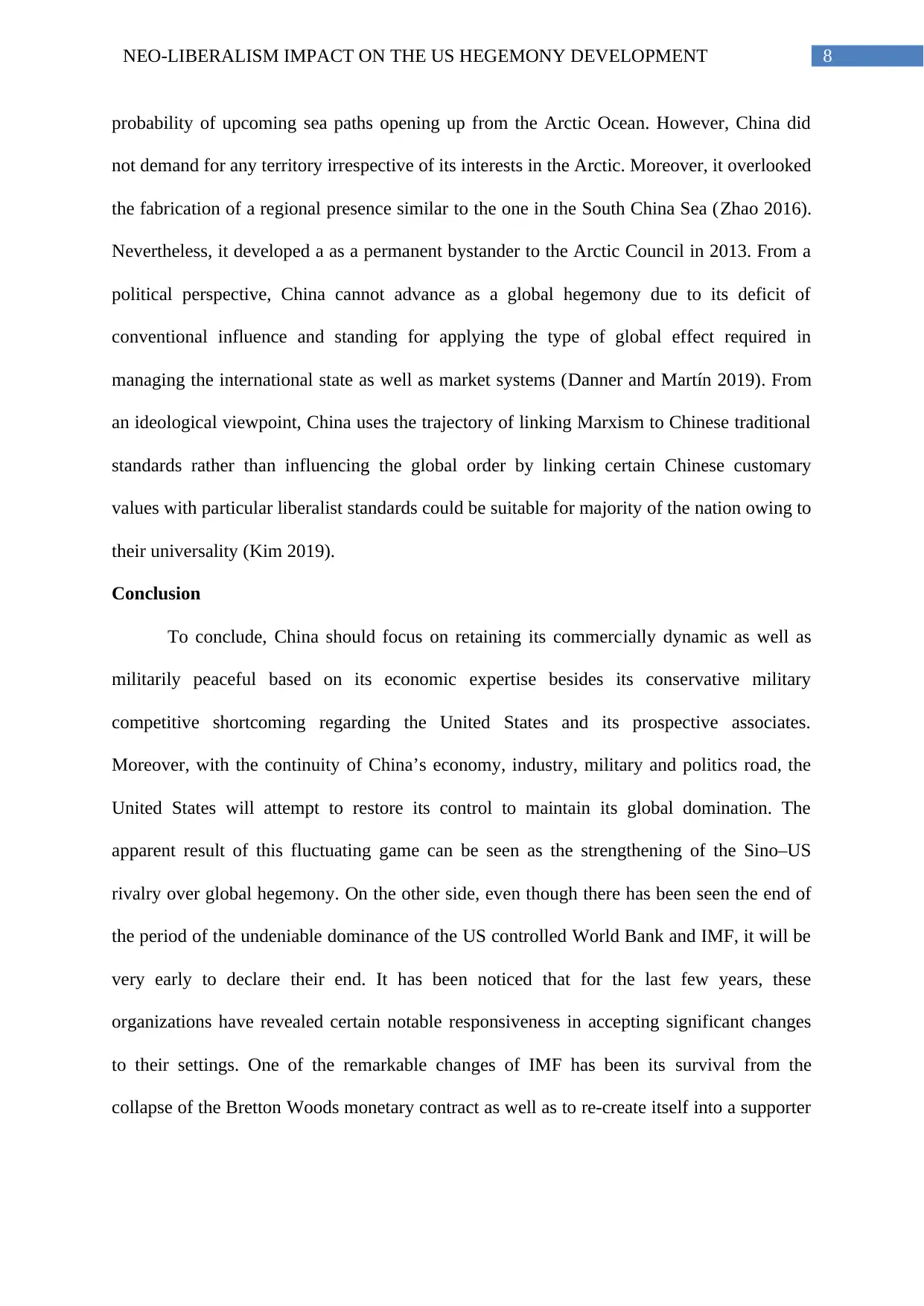
8NEO-LIBERALISM IMPACT ON THE US HEGEMONY DEVELOPMENT
probability of upcoming sea paths opening up from the Arctic Ocean. However, China did
not demand for any territory irrespective of its interests in the Arctic. Moreover, it overlooked
the fabrication of a regional presence similar to the one in the South China Sea (Zhao 2016).
Nevertheless, it developed a as a permanent bystander to the Arctic Council in 2013. From a
political perspective, China cannot advance as a global hegemony due to its deficit of
conventional influence and standing for applying the type of global effect required in
managing the international state as well as market systems (Danner and Martín 2019). From
an ideological viewpoint, China uses the trajectory of linking Marxism to Chinese traditional
standards rather than influencing the global order by linking certain Chinese customary
values with particular liberalist standards could be suitable for majority of the nation owing to
their universality (Kim 2019).
Conclusion
To conclude, China should focus on retaining its commercially dynamic as well as
militarily peaceful based on its economic expertise besides its conservative military
competitive shortcoming regarding the United States and its prospective associates.
Moreover, with the continuity of China’s economy, industry, military and politics road, the
United States will attempt to restore its control to maintain its global domination. The
apparent result of this fluctuating game can be seen as the strengthening of the Sino–US
rivalry over global hegemony. On the other side, even though there has been seen the end of
the period of the undeniable dominance of the US controlled World Bank and IMF, it will be
very early to declare their end. It has been noticed that for the last few years, these
organizations have revealed certain notable responsiveness in accepting significant changes
to their settings. One of the remarkable changes of IMF has been its survival from the
collapse of the Bretton Woods monetary contract as well as to re-create itself into a supporter
probability of upcoming sea paths opening up from the Arctic Ocean. However, China did
not demand for any territory irrespective of its interests in the Arctic. Moreover, it overlooked
the fabrication of a regional presence similar to the one in the South China Sea (Zhao 2016).
Nevertheless, it developed a as a permanent bystander to the Arctic Council in 2013. From a
political perspective, China cannot advance as a global hegemony due to its deficit of
conventional influence and standing for applying the type of global effect required in
managing the international state as well as market systems (Danner and Martín 2019). From
an ideological viewpoint, China uses the trajectory of linking Marxism to Chinese traditional
standards rather than influencing the global order by linking certain Chinese customary
values with particular liberalist standards could be suitable for majority of the nation owing to
their universality (Kim 2019).
Conclusion
To conclude, China should focus on retaining its commercially dynamic as well as
militarily peaceful based on its economic expertise besides its conservative military
competitive shortcoming regarding the United States and its prospective associates.
Moreover, with the continuity of China’s economy, industry, military and politics road, the
United States will attempt to restore its control to maintain its global domination. The
apparent result of this fluctuating game can be seen as the strengthening of the Sino–US
rivalry over global hegemony. On the other side, even though there has been seen the end of
the period of the undeniable dominance of the US controlled World Bank and IMF, it will be
very early to declare their end. It has been noticed that for the last few years, these
organizations have revealed certain notable responsiveness in accepting significant changes
to their settings. One of the remarkable changes of IMF has been its survival from the
collapse of the Bretton Woods monetary contract as well as to re-create itself into a supporter
⊘ This is a preview!⊘
Do you want full access?
Subscribe today to unlock all pages.

Trusted by 1+ million students worldwide
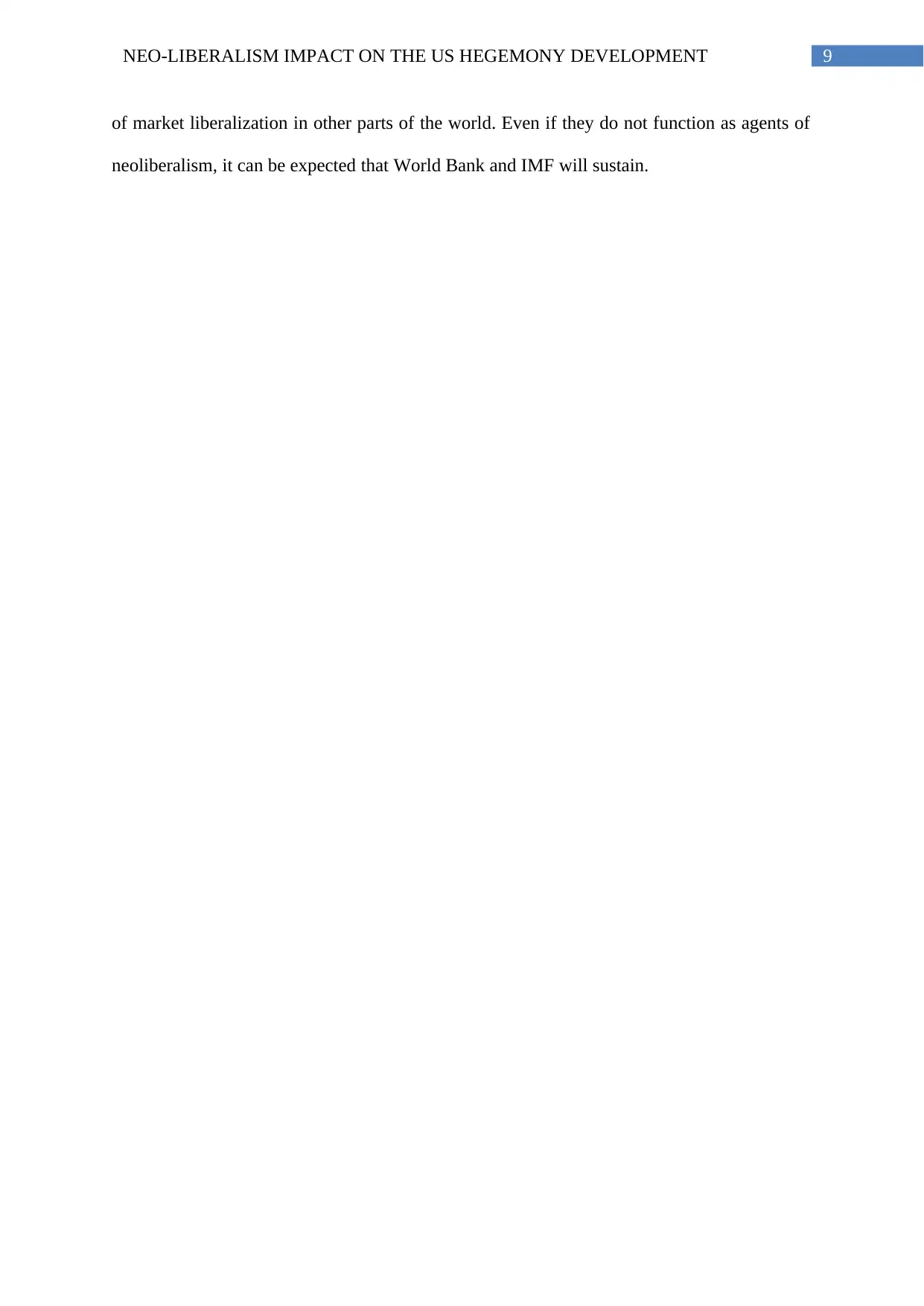
9NEO-LIBERALISM IMPACT ON THE US HEGEMONY DEVELOPMENT
of market liberalization in other parts of the world. Even if they do not function as agents of
neoliberalism, it can be expected that World Bank and IMF will sustain.
of market liberalization in other parts of the world. Even if they do not function as agents of
neoliberalism, it can be expected that World Bank and IMF will sustain.
Paraphrase This Document
Need a fresh take? Get an instant paraphrase of this document with our AI Paraphraser
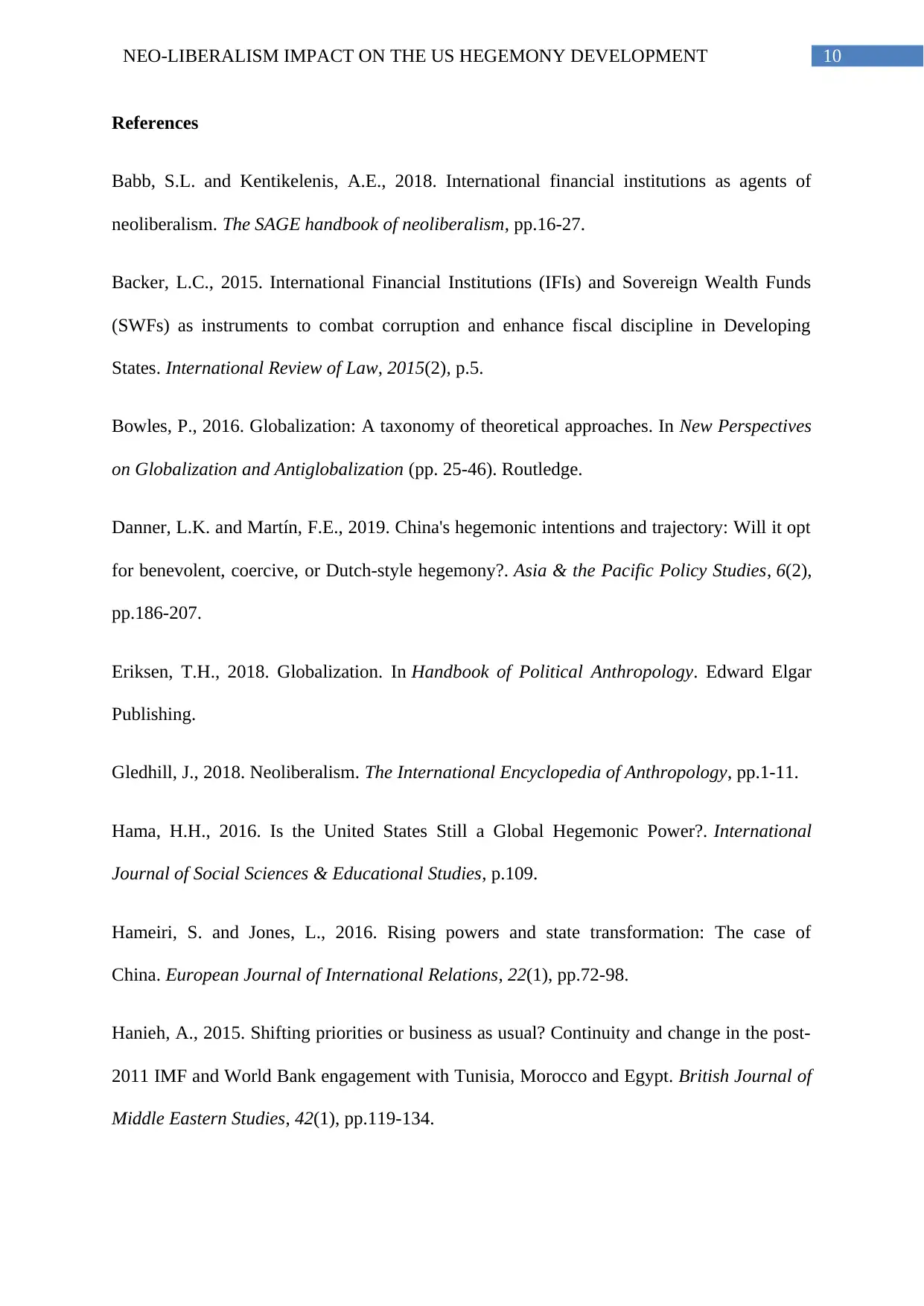
10NEO-LIBERALISM IMPACT ON THE US HEGEMONY DEVELOPMENT
References
Babb, S.L. and Kentikelenis, A.E., 2018. International financial institutions as agents of
neoliberalism. The SAGE handbook of neoliberalism, pp.16-27.
Backer, L.C., 2015. International Financial Institutions (IFIs) and Sovereign Wealth Funds
(SWFs) as instruments to combat corruption and enhance fiscal discipline in Developing
States. International Review of Law, 2015(2), p.5.
Bowles, P., 2016. Globalization: A taxonomy of theoretical approaches. In New Perspectives
on Globalization and Antiglobalization (pp. 25-46). Routledge.
Danner, L.K. and Martín, F.E., 2019. China's hegemonic intentions and trajectory: Will it opt
for benevolent, coercive, or Dutch‐style hegemony?. Asia & the Pacific Policy Studies, 6(2),
pp.186-207.
Eriksen, T.H., 2018. Globalization. In Handbook of Political Anthropology. Edward Elgar
Publishing.
Gledhill, J., 2018. Neoliberalism. The International Encyclopedia of Anthropology, pp.1-11.
Hama, H.H., 2016. Is the United States Still a Global Hegemonic Power?. International
Journal of Social Sciences & Educational Studies, p.109.
Hameiri, S. and Jones, L., 2016. Rising powers and state transformation: The case of
China. European Journal of International Relations, 22(1), pp.72-98.
Hanieh, A., 2015. Shifting priorities or business as usual? Continuity and change in the post-
2011 IMF and World Bank engagement with Tunisia, Morocco and Egypt. British Journal of
Middle Eastern Studies, 42(1), pp.119-134.
References
Babb, S.L. and Kentikelenis, A.E., 2018. International financial institutions as agents of
neoliberalism. The SAGE handbook of neoliberalism, pp.16-27.
Backer, L.C., 2015. International Financial Institutions (IFIs) and Sovereign Wealth Funds
(SWFs) as instruments to combat corruption and enhance fiscal discipline in Developing
States. International Review of Law, 2015(2), p.5.
Bowles, P., 2016. Globalization: A taxonomy of theoretical approaches. In New Perspectives
on Globalization and Antiglobalization (pp. 25-46). Routledge.
Danner, L.K. and Martín, F.E., 2019. China's hegemonic intentions and trajectory: Will it opt
for benevolent, coercive, or Dutch‐style hegemony?. Asia & the Pacific Policy Studies, 6(2),
pp.186-207.
Eriksen, T.H., 2018. Globalization. In Handbook of Political Anthropology. Edward Elgar
Publishing.
Gledhill, J., 2018. Neoliberalism. The International Encyclopedia of Anthropology, pp.1-11.
Hama, H.H., 2016. Is the United States Still a Global Hegemonic Power?. International
Journal of Social Sciences & Educational Studies, p.109.
Hameiri, S. and Jones, L., 2016. Rising powers and state transformation: The case of
China. European Journal of International Relations, 22(1), pp.72-98.
Hanieh, A., 2015. Shifting priorities or business as usual? Continuity and change in the post-
2011 IMF and World Bank engagement with Tunisia, Morocco and Egypt. British Journal of
Middle Eastern Studies, 42(1), pp.119-134.
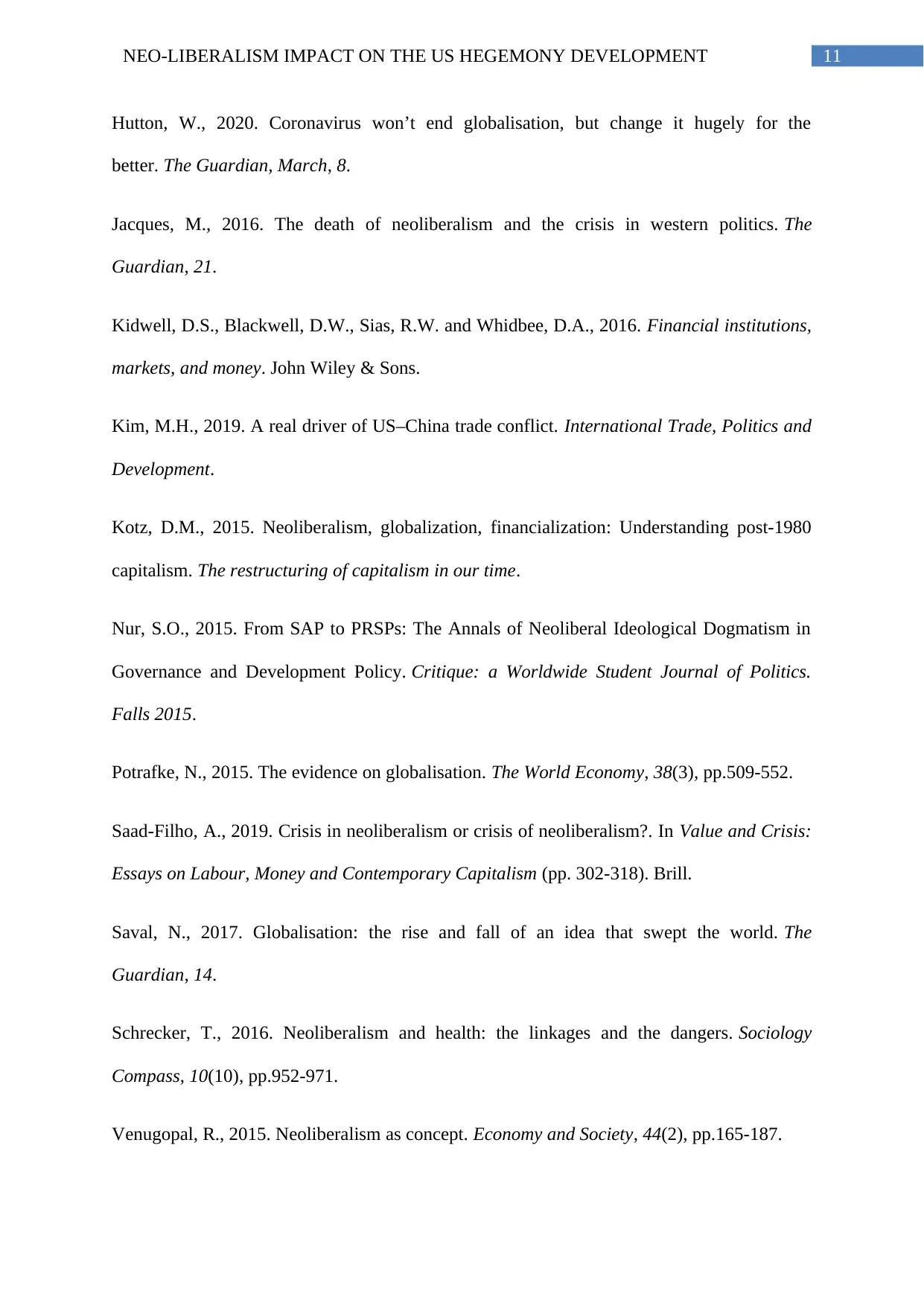
11NEO-LIBERALISM IMPACT ON THE US HEGEMONY DEVELOPMENT
Hutton, W., 2020. Coronavirus won’t end globalisation, but change it hugely for the
better. The Guardian, March, 8.
Jacques, M., 2016. The death of neoliberalism and the crisis in western politics. The
Guardian, 21.
Kidwell, D.S., Blackwell, D.W., Sias, R.W. and Whidbee, D.A., 2016. Financial institutions,
markets, and money. John Wiley & Sons.
Kim, M.H., 2019. A real driver of US–China trade conflict. International Trade, Politics and
Development.
Kotz, D.M., 2015. Neoliberalism, globalization, financialization: Understanding post-1980
capitalism. The restructuring of capitalism in our time.
Nur, S.O., 2015. From SAP to PRSPs: The Annals of Neoliberal Ideological Dogmatism in
Governance and Development Policy. Critique: a Worldwide Student Journal of Politics.
Falls 2015.
Potrafke, N., 2015. The evidence on globalisation. The World Economy, 38(3), pp.509-552.
Saad-Filho, A., 2019. Crisis in neoliberalism or crisis of neoliberalism?. In Value and Crisis:
Essays on Labour, Money and Contemporary Capitalism (pp. 302-318). Brill.
Saval, N., 2017. Globalisation: the rise and fall of an idea that swept the world. The
Guardian, 14.
Schrecker, T., 2016. Neoliberalism and health: the linkages and the dangers. Sociology
Compass, 10(10), pp.952-971.
Venugopal, R., 2015. Neoliberalism as concept. Economy and Society, 44(2), pp.165-187.
Hutton, W., 2020. Coronavirus won’t end globalisation, but change it hugely for the
better. The Guardian, March, 8.
Jacques, M., 2016. The death of neoliberalism and the crisis in western politics. The
Guardian, 21.
Kidwell, D.S., Blackwell, D.W., Sias, R.W. and Whidbee, D.A., 2016. Financial institutions,
markets, and money. John Wiley & Sons.
Kim, M.H., 2019. A real driver of US–China trade conflict. International Trade, Politics and
Development.
Kotz, D.M., 2015. Neoliberalism, globalization, financialization: Understanding post-1980
capitalism. The restructuring of capitalism in our time.
Nur, S.O., 2015. From SAP to PRSPs: The Annals of Neoliberal Ideological Dogmatism in
Governance and Development Policy. Critique: a Worldwide Student Journal of Politics.
Falls 2015.
Potrafke, N., 2015. The evidence on globalisation. The World Economy, 38(3), pp.509-552.
Saad-Filho, A., 2019. Crisis in neoliberalism or crisis of neoliberalism?. In Value and Crisis:
Essays on Labour, Money and Contemporary Capitalism (pp. 302-318). Brill.
Saval, N., 2017. Globalisation: the rise and fall of an idea that swept the world. The
Guardian, 14.
Schrecker, T., 2016. Neoliberalism and health: the linkages and the dangers. Sociology
Compass, 10(10), pp.952-971.
Venugopal, R., 2015. Neoliberalism as concept. Economy and Society, 44(2), pp.165-187.
⊘ This is a preview!⊘
Do you want full access?
Subscribe today to unlock all pages.

Trusted by 1+ million students worldwide
1 out of 13
Related Documents
Your All-in-One AI-Powered Toolkit for Academic Success.
+13062052269
info@desklib.com
Available 24*7 on WhatsApp / Email
![[object Object]](/_next/static/media/star-bottom.7253800d.svg)
Unlock your academic potential
Copyright © 2020–2026 A2Z Services. All Rights Reserved. Developed and managed by ZUCOL.





